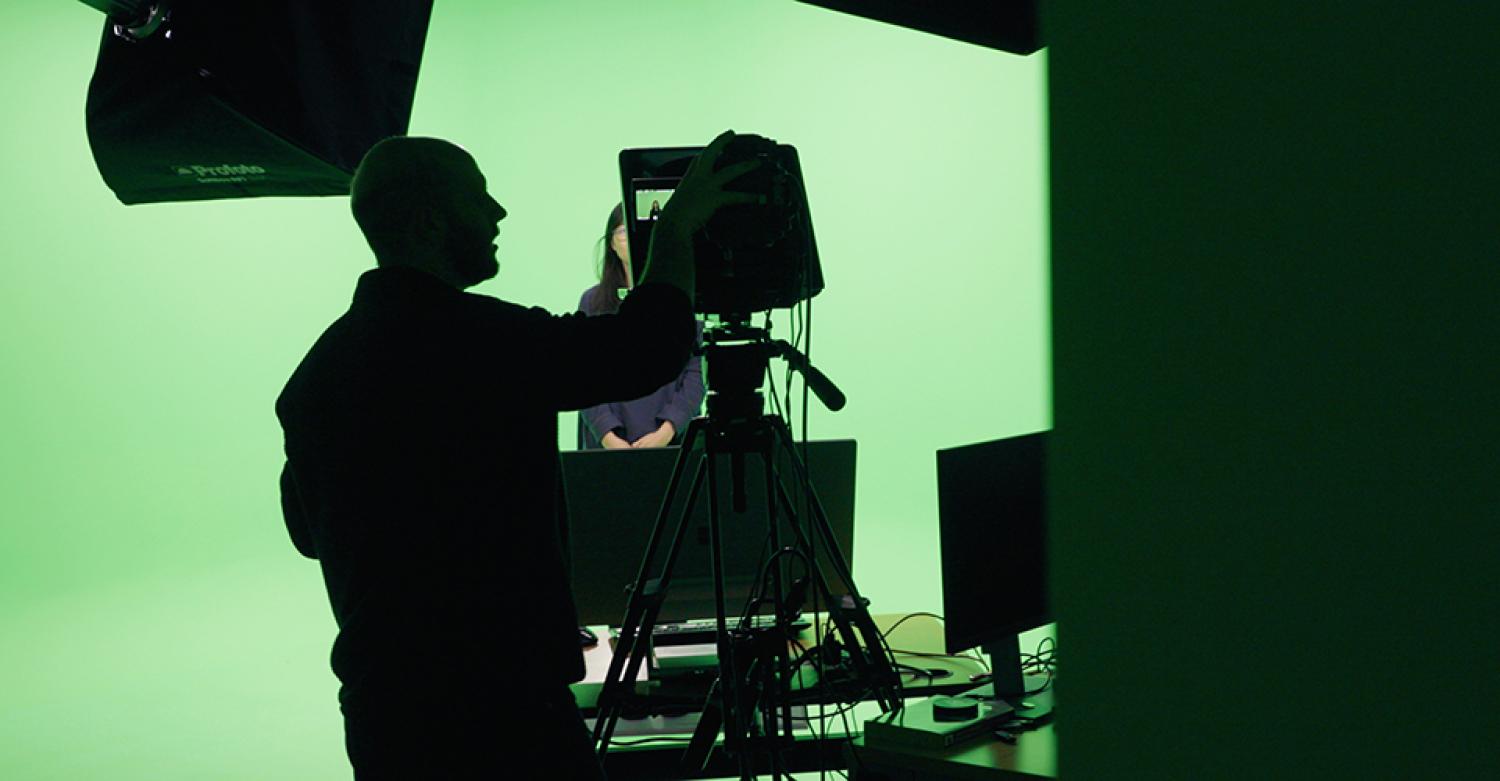Leeds Opens New Studio to Meet Growing Demand for Video Instruction

Technology builds on school’s commitment to better distance-learning experiences and more efficient use of classroom time.
A videographer checks his equipment as Liu Liu, an assistant professor of marketing, records a video for the Modern Artificial Intelligence course she teaches in the business analytics master’s program at Leeds. The school’s new studio space gives faculty access to professionals and state-of-the-art tools to create high-quality videos for distance learning programs.
While the pandemic made Zoom ubiquitous, businesses already were experimenting with virtual meetings, hybrid work and telecommuting when the world went into lockdown in early 2020.
Business schools, on the other hand, had to quickly build virtual experiences and recreate a high-quality learning experience for scattered classes of students. And it wasn’t just a matter of finding ways to encourage collaboration among remote classmates—it was making do with substandard equipment, oftentimes in awkward places, like a professor’s kitchen while children cavorted in the background.
At the Leeds School of Business, though, the days of cat filters and audio anomalies are over. The school recently cut the ribbon on a state-of-the-art studio space in the Koelbel Building that’s changing how faculty deliver courses and engage with students—even those courses that are delivered in a traditional onsite classroom. Along with higher-quality content, the studio offers improved editing capabilities and the opportunity for more creative recording techniques.
“What the new studio is able to do is create these really high-quality videos that students can watch before a class to enrich their experience,” said Tracy Jennings, a teaching professor at Leeds and faculty director for distance and online education. “That opens up classes for more discussion and more kind of active learning that are more effective than just lecturing.”
A game-changer for hybrid courses
That’s how Lawrence Williams, an associate professor of marketing at Leeds, uses video to supplement the hybrid MBA and distance-learning courses he teaches. Time in class, he said, can focus on deeper engagement with the material, through more specific questions or additional opportunities for students to collaborate on applied, project-based work.
“The studio has been a godsend, mainly because of the talent of the staff,” Williams said, noting that he’s able to record in minutes what took him hours to assemble during the pandemic. “It helps me focus more time and energy on updating the content and structure of the class, instead of wrestling with video editing software.”
The studio is staffed by professionals who ensure the recording experience is comfortable and seamless. The space is equipped with state-of-the-art technology—including a green screen built as a stretched “cyc wall” that creates a more immersive watching experience, and an all-in-one tricaster system that helps speed video production without sacrificing quality.
For Jennings, the studio and the high-quality content it enables aren’t the full story, though. Her previous career was in user experience design and product development at IBM and US West, which has helped her bring a consistent look to the Canvas course design used in graduate programs, including the executive MBA, hybrid MBA, and master’s in business analytics.
“Since the faculty teaching in these programs use the same Canvas course design, students don’t struggle to find any course materials, including videos,” she said.
For Kristi Ryujin, well-organized content is as important as well-created content.
“One of the things we continue to hear from our students it that what we’re doing is making it easier for them to learn and be successful,” said Ryujin, associate dean for the graduate division and special assistant to the dean for faculty diversity, equity and inclusion. “The more frustrated students get in navigating Canvas, or trying to follow along on a low-quality video, the less time and energy they have to focus on what they want to learn.”
Showcasing world-class Leeds faculty
“The studio gives us a space that really showcases our world-class faculty,” she said. “We’re making it easy for the faculty to embrace this technology, and have the confidence that their videos will be clean and help make learning easier for their students.”
Part of making learning easier is accommodating different learning styles, which the studio helps make possible. That could mean slowing down the audio to improve comprehension, embedding videos and charts for visual learners—even just rewinding a particularly technical discussion to better absorb the material. For Williams, that’s a key benefit to high-quality video.
“It gives students control over the rate and pace of their lecture consumption,” he said, such as taking breaks when they need time to digest a complicated idea. “And as they are working on projects, they can refer back, not only to their notes, but to the actual lecture content most relevant to their current concerns.”
He also noted that the tools and guidance available in the studio help create more engaging video, which can help students retain what they learn. For Jennings, that’s a key selling point of the studio’s value to Leeds.
“Even as school has returned toward mostly face-to-face learning, there’s pressure to have videos available for offline enrichment and distance-learning opportunities,” Jennings said. “We’re getting better at it, and the new studio is really taking us to the next level.”







